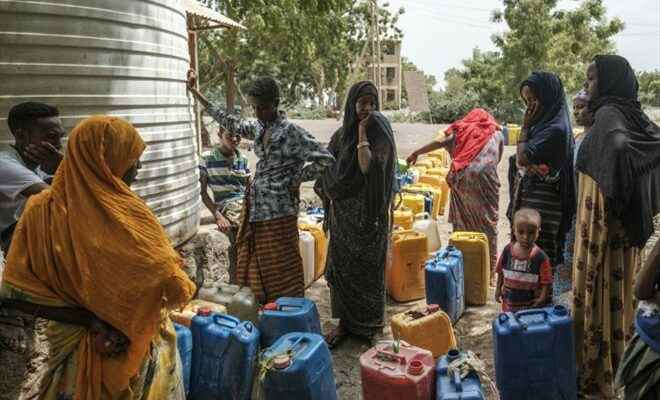At a market in Addis Ababa on September 11, 2022 (AFP/Archives/Amanuel Sileshi)
“All prices are going up, but not our wages,” sums up Zerihun, a porter at the sprawling Merkato market in Addis Ababa. A finding shared by a majority of Ethiopians in the face of an economy in crisis.
One of the most dynamic economies in the world during the 2010s, Ethiopia saw its growth hampered by the Covid-19 pandemic, climatic calamities, the conflict in Tigray which has devastated the north of the country since 2020 and the wave of global shock of the war in Ukraine.
Africa’s second most populous country suffers, among other ills, from runaway inflation which, according to official statistics, is expected to exceed 30% on annual average in 2022 (after more than 26% in 2021), driven by prices food.
“Vegetables, food, rents, everything has gone up,” says Zerihun, 30 and father of two, who loads and unloads trucks at Merkato, considered Africa’s largest open-air market.
“We work, but the cost of living makes existence very difficult,” confirms his colleague Sintayeh Tadelle, 29, who has two sons aged 12 and 6 and “no savings”.
When asked how he is doing, this tough, loud-mouthed man replies: “God help us”. The municipality of Addis Ababa also, which “provides uniform and school books, as well as meals” in the canteen: “Without that, I don’t know how I could survive”.
Merkato handlers earn 5 birr (8 euro cents) per crate loaded or unloaded. On good days, they earn a little more than 5 euros.
“The economy is slow, there is less work ‘on the market’ and therefore I earn less,” says Zirehun.
– “It’s less lively” –
Cluttered with stalls or goods of all kinds, the streets of Merkato teem with buyers, sellers, touts and overloaded jobbers.
But according to regulars in this market with thousands of shops where you can find everything – from clothing to building materials and industrial machinery, including electronics and household appliances – activity has declined.
“In all sectors of the market, people say the same thing: it’s less lively,” says Hamat Redi, 26, who sells washing machines and televisions, mainly Chinese.
In her shop, “5-6 months ago, business was okay, but now it’s very sluggish”, she continues: “With inflation, people don’t want to spend on luxury goods”, what are its products in Ethiopia.
A little further on, in addition to the absence of customers, Sisai Desalegn complains of the lack of dollars to be able to import his sound equipment and solar panels.

At a market in Dire Dawa, October 23, 2022 (AFP/Archives/Amanuel Sileshi)
“We don’t get enough foreign currency from the banks”, due to a shortage that has worsened, explains this 30-year-old whose activity has fallen by 40% in two years.
“There are few buyers (…) we do not make a profit and we sell at the purchase price”, assures this father of two children who, to get by, reduces his daily expenses.
“It’s very difficult to do with what we have”, he underlines, “we don’t stop everything completely, but we reduce the amounts or the frequency” of what is not essential.
– Multiple causes –
Those interviewed at Merkato attribute the economic situation to the war that ravaged the north of the country for two years.
The end of trade with the north means fewer trucks to load or unload, explain Zerihun and Sintayeh. And Sisa Desalegn no longer sees her clients as traders or farmers from the northern regions.
The conflict has strained government finances and hit sectors like agriculture and industry hard.
By scaring away investors and foreign partners, it also contributed to the drying up of the currencies of an ultra-importing country.
Zerihun “hopes that the peace agreement” signed on November 2 between the government and the Tigray rebels “will improve the situation”.

Water supply for displaced people near Semera, June 7, 2022 (AFP/Archives/EDUARDO SOTERAS)
But the conflict only aggravated a crisis that had already begun with the Covid-19 pandemic. Growth – 9.7% on average between 2010 and 2018 – had seriously slowed down from 2020, falling to 6.1% against 9% the previous year. In 2022, it will fall below 4% against 6.3% in 2021, according to the IMF.
In a country that is 75% rural, the vagaries of the weather – notably the drought that is ravaging the Horn of Africa – have also weighed on agriculture (a third of GDP), contributing to the explosion in food prices.
Whatever the reasons, “in the end, it all affects low-income people like us,” Zehirun can only see.
© 2022 AFP
Did you like this article ? Share it with your friends with the buttons below.




